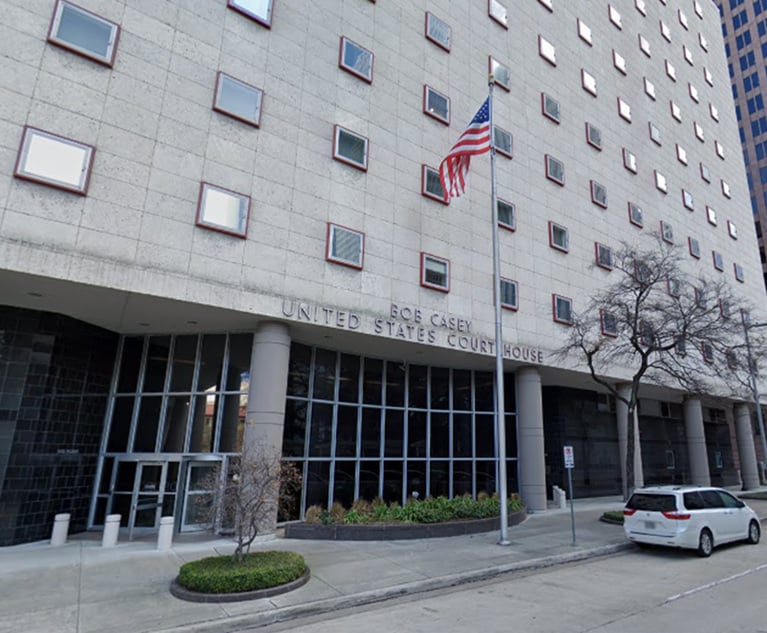I Never Agreed to That
With the adoption of the Texas Arbitration Act, the last half-century has been marked by a steady increase in courts' willingness to, and even preference for, enforcing arbitration provisions.
May 13, 2020 at 09:31 PM
9 minute read
 Craig Duewall (shareholder) and Alan W. Hersh (associate) of Greenberg Traurig. (Courtesy photo)
Craig Duewall (shareholder) and Alan W. Hersh (associate) of Greenberg Traurig. (Courtesy photo)
Developments in Texas' Enforcement of Involuntary Arbitration Provisions
With the adoption of the Texas Arbitration Act, the last half-century has been marked by a steady increase in courts' willingness to, and even preference for, enforcing arbitration provisions. See Yvette Ostolaza's "Overview of Arbitration Clauses in Consumer Financial Services Contracts," 40 Tex. Tech. L. Rev. 37, 41-43 (2007). Indeed, courts generally only refuse to enforce an arbitration agreement on three principal grounds: (1) the parties have not contractually agreed to arbitrate; G.T. Leach Builders v. Sapphire V.P., 458 S.W.3d 502, 524 (Tex. 2015); Archer & White Sales v. Henry Schein, 878 F.3d 488, 492 (5th Cir. 2017); (2) the dispute is not within the scope of the arbitration provision; Ellis v. Schlimmer, 337 S.W.3d 860, 862 (Tex. 2011); or (3) some state law defense, such as fraudulent inducement, applies specifically to the arbitration provision. Young v. Valt.X Holdings, 336 S.W.3d 258, 262 (Tex. App.—Austin 2010, pet. dism'd). Over the last few years, however, the first requirement—i.e., whether the parties actually agreed to arbitrate—has come into doubt.
In a series of cases, courts have been willing to enforce an arbitration provision by or against a party who never explicitly agreed to them. This article summarizes that trend, the rationales by which courts have enforced arbitration provisions against nonsignatories, and potential avenues to protect yourself from unagreed to arbitration
A Trend Emerges
Beginning with employment contracts, Texas courts began confronting issues where one party unilaterally amended a contract to add a requirement to arbitrate disputes. In re Halliburton, 80 S.W.3d 566 (Tex. 2002). Employment cases at least had some guidance from precedent. Texas has long recognized that as long as an employee is given sufficient notice, an employer can amend employment terms prospectively. See Hathaway v. General Mills, 711 S.W.2d 227 (Tex. 1986). Thus, notice—and the implicit requirement that arbitration rights not be "illusory"—are all that are required to allow employers to add arbitration provisions to existing employment agreements. In re Halliburton, 80 S.W.3d at 569-71.
However, could individuals in other contexts have to submit to arbitration agreements they never agreed to? For example, can corporations amend their bylaws to require executives, directors or shareholders to arbitrate disputes? Could insurance contracts or loan agreements be amended to compel arbitration?
Furthermore, what about compelling arbitration by or against companies or individuals that are themselves not parties to an arbitration agreement? Given that, even implicitly, only parties to the arbitration agreement assent to it, how could a nonparty be allowed or required to enforce an arbitration agreement?
In each of these contexts, there have been instances in which the courts have compelled arbitration against individuals or business who never anticipated or agreed to arbitrate these issues. This trend of compelling arbitration against nonsignatories raises planning issues for all businesses with even tangential connection to Texas businesses. Moreover, it offers lopsided benefits to parties seeking to compel arbitration, because only a court's order denying a motion to compel arbitration is subject to immediate appeal. In re Gulf Exploration, 289 S.W.3d 836 (Tex. 2009) (explaining that while Texas Arbitration Act permits interlocutory appeal from denial of motion to compel arbitration, neither interlocutory appeal nor mandamus are available from order granting motion to compel).
Rationales for Compelling Arbitration Against Nonsignatories
There are essentially two categories of groups who may be compelled to arbitrate disputes. The first are instances in which one party has a unilateral or superior right to amend the contract without the other party's consent. The second is where nonparties to the contract either seek to enforce or are bound to an arbitration agreement based on their relationship to a party to the contract. The legal issues surrounding each category is distinct, and will be addressed separately.
- Unilateral right to add an arbitration agreement.
Employment agreements are not the only instance of contracts that can be unilaterally amended by one party at the expense of another. For example, corporate formation documents—such as bylaws or articles of incorporation—can frequently be amended by a simple majority vote. See Tex. Bus. & Comm. Code Section 21.052. Thus shareholders, directors or executives might find their corporate rights redefined to include an unexpected arbitration agreement.
Although the Texas Supreme Court has not directly ruled on this issue, there is some clear support in other cases. In Pinto Technology Ventures v. Sheldon, the court confronted a shareholder agreement that was amended multiple times to add a forum-selection clause. 526 S.W.3d 428 (2017). The shareholder at issue had not only purchased his shares before the forum-selection clause was added, he repeatedly voted against the amendments to the shareholder agreement. Moreover, unlike the employee who continues to receive salary as compensation in exchange for submitting to a new arbitration provision, a shareholder does not gain any rights or additional shares in exchange for an amended shareholder agreement.
Nevertheless, Pinto held that by originally purchasing shares that could be amended by majority vote, the shareholder "bound himself to any properly amended forum-selection clause." Tellingly, the court cited and "dr[ew] analogies between forum-selection causes and arbitration clauses, which are a 'specialized kind of forum-selection clause,'" quoting Scherk v. Alberto-Culver, 417 U.S. 506, 519 (1974). Thus, Pinto all but held that its analysis would be the same for arbitration provisions. At least one Texas district court has similarly compelled arbitration when a company agreement was amended to add an arbitration provision. See Phipps v. Nikkels, Case No. D-1-GN-18-002708, 126th District Court of Travis Cty., Texas.
If utilized more frequently, corporations may amend their corporate documents to add arbitration provision to avoid the costs and burdens of shareholder derivative suits, minority-shareholder oppression claims, and ultra vires claims.
- Compelling arbitration by or against third parties.
Perhaps more logically challenging are cases in which a party who has signed an arbitration agreement has sought to enforce the agreement against strangers to the contract. Conversely, parties who are strangers to arbitration agreements have sought to compel arbitration against parties. These extracontractual enforcements of contractual arbitration provisions have been approved—or rejected—on various grounds.
In the context of nonparties being compelled to arbitration, the cases are clearer. Texas Law "requires a nonparty to arbitrate a claim if it seeks, through the claim, to derive a direct benefit from the contract containing the arbitration provision," see In re Vesta Insurance Group, 192 S.W.3d 759. 761 (Tex. 2006) (internal quotations omitted). For a clear example, if a nonparty claims that it is a third-party beneficiary to a contract, the defendant can compel the nonparty to abide by the contract's arbitration provision. By comparison, a nonparty is not required to arbitrate claims that only tangentially relate to a contract that contains an arbitration provision. See id. (refusing to enforce arbitration provision that was not sufficiently related to subcontractors claim against project manager); Janvey v. Alguire, 847 F.3d 231 (5th Cir. 2017) (holding that reference to "affiliates" in arbitration agreement was not enough to compel bank to arbitrate claims for fraudulent transfer).
However, there are many theories by which nonparties have sought to take advantage of an arbitration provision they did not sign, with more varying success. For example, the Texas Supreme Court refused to allow a signatory to arbitrate claims against nonsignatory defendants for alleged "concerted misconduct" with a party to the agreement. In re Labatt Food Service, 279 S.W.3d 640, 644 (Tex. 2009). Similarly, when a third-party nonsignatory sued for alleged direct benefits under a contract, the court held that the defendant signatory was under no obligation to exercise its right to arbitrate the claim. Van Zanten v. Energy Transfer Partners, 320 S.W.3d 845 (Tex. App.—Houston (1st Dist.) 2010, no pet.). By contrast, courts have allowed nonsignatory defendants to compel arbitration where plaintiff-signatories sue for such claims as tortious interference, Hays v. HC Holdings, 838 F.3d 605 (5th Cir. 2016), or trade-secret misappropriation. The Muecke Co. v. CVS Caremark, 615 Fed. App'x 837 (5th Cir. 2015).
Two principles can be derived from these cases. First, courts will not allow signatories to compel nonparties to arbitration in a way that would make arbitration provisions "easier to enforce than other contracts." Glassell Producing v. Jared Resources, 422 S.W.3d 68, 82 (Tex. App.—Texarkana 2014, no pet.) (internal quotations omitted). Second, courts will generally only allow nonparties to enforce an arbitration agreement when they are the defendant and the signatory plaintiff's claims relate to the underlying contract. Given the nearly endless unique relationships of parties and claims, these two general principles will likely be tested and refined until the Texas Supreme Court offers more concrete guidance.
- Conclusion and recommendation.
Given the evolving nature of enforcing arbitration agreements against nonsignatories, numerous opportunities exist to force litigation into arbitration in ways that might not have existed a few years ago. Business entities should consider amending their corporate governing documents to add arbitration provisions. Similarly, clients and their counsel that are entangled in litigation should review every potentially relevant contract—even those the client did not sign—to see if there is an arbitration agreement that might cover the dispute. By contrast, attorneys seeking to avoid arbitration may find a tougher road toward their own day in court.
Craig Duewall is a shareholder at Greenberg Traurig. He focuses his complex commercial litigation and arbitration practice on cases involving class actions, trade secrets, private equity, environmental, oil and gas, securities fraud, fiduciary duty, construction, real estate, business and partnership disputes, and insurance coverage.
Alan W. Hersh is an associate at the firm. He focuses his practice on class action and antitrust litigation, and is experienced in handling asset purchase negotiations, lien and land restrictions on client holdings, and class action appellate issues.
This content has been archived. It is available through our partners, LexisNexis® and Bloomberg Law.
To view this content, please continue to their sites.
Not a Lexis Subscriber?
Subscribe Now
Not a Bloomberg Law Subscriber?
Subscribe Now
NOT FOR REPRINT
© 2025 ALM Global, LLC, All Rights Reserved. Request academic re-use from www.copyright.com. All other uses, submit a request to [email protected]. For more information visit Asset & Logo Licensing.
You Might Like
View All
Conspiracy Suits Against Quinn Emanuel, Roc Nation Moved to Federal District Court

JCPenney Seeks Return of More Than $1.1M From Jackson Walker For Bankruptcy Work
3 minute read
Ex-Appellate Court Judges Launch Boutique Focused on Plaintiffs Appeals
2 minute read
O'Melveny, White & Case, Skadden Beef Up in Texas With Energy, Real Estate Lateral Partner Hires
5 minute readLaw Firms Mentioned
Trending Stories
- 1Uber Files RICO Suit Against Plaintiff-Side Firms Alleging Fraudulent Injury Claims
- 2The Law Firm Disrupted: Scrutinizing the Elephant More Than the Mouse
- 3Inherent Diminished Value Damages Unavailable to 3rd-Party Claimants, Court Says
- 4Pa. Defense Firm Sued by Client Over Ex-Eagles Player's $43.5M Med Mal Win
- 5Losses Mount at Morris Manning, but Departing Ex-Chair Stays Bullish About His Old Firm's Future
Who Got The Work
J. Brugh Lower of Gibbons has entered an appearance for industrial equipment supplier Devco Corporation in a pending trademark infringement lawsuit. The suit, accusing the defendant of selling knock-off Graco products, was filed Dec. 18 in New Jersey District Court by Rivkin Radler on behalf of Graco Inc. and Graco Minnesota. The case, assigned to U.S. District Judge Zahid N. Quraishi, is 3:24-cv-11294, Graco Inc. et al v. Devco Corporation.
Who Got The Work
Rebecca Maller-Stein and Kent A. Yalowitz of Arnold & Porter Kaye Scholer have entered their appearances for Hanaco Venture Capital and its executives, Lior Prosor and David Frankel, in a pending securities lawsuit. The action, filed on Dec. 24 in New York Southern District Court by Zell, Aron & Co. on behalf of Goldeneye Advisors, accuses the defendants of negligently and fraudulently managing the plaintiff's $1 million investment. The case, assigned to U.S. District Judge Vernon S. Broderick, is 1:24-cv-09918, Goldeneye Advisors, LLC v. Hanaco Venture Capital, Ltd. et al.
Who Got The Work
Attorneys from A&O Shearman has stepped in as defense counsel for Toronto-Dominion Bank and other defendants in a pending securities class action. The suit, filed Dec. 11 in New York Southern District Court by Bleichmar Fonti & Auld, accuses the defendants of concealing the bank's 'pervasive' deficiencies in regards to its compliance with the Bank Secrecy Act and the quality of its anti-money laundering controls. The case, assigned to U.S. District Judge Arun Subramanian, is 1:24-cv-09445, Gonzalez v. The Toronto-Dominion Bank et al.
Who Got The Work
Crown Castle International, a Pennsylvania company providing shared communications infrastructure, has turned to Luke D. Wolf of Gordon Rees Scully Mansukhani to fend off a pending breach-of-contract lawsuit. The court action, filed Nov. 25 in Michigan Eastern District Court by Hooper Hathaway PC on behalf of The Town Residences LLC, accuses Crown Castle of failing to transfer approximately $30,000 in utility payments from T-Mobile in breach of a roof-top lease and assignment agreement. The case, assigned to U.S. District Judge Susan K. Declercq, is 2:24-cv-13131, The Town Residences LLC v. T-Mobile US, Inc. et al.
Who Got The Work
Wilfred P. Coronato and Daniel M. Schwartz of McCarter & English have stepped in as defense counsel to Electrolux Home Products Inc. in a pending product liability lawsuit. The court action, filed Nov. 26 in New York Eastern District Court by Poulos Lopiccolo PC and Nagel Rice LLP on behalf of David Stern, alleges that the defendant's refrigerators’ drawers and shelving repeatedly break and fall apart within months after purchase. The case, assigned to U.S. District Judge Joan M. Azrack, is 2:24-cv-08204, Stern v. Electrolux Home Products, Inc.
Featured Firms
Law Offices of Gary Martin Hays & Associates, P.C.
(470) 294-1674
Law Offices of Mark E. Salomone
(857) 444-6468
Smith & Hassler
(713) 739-1250






